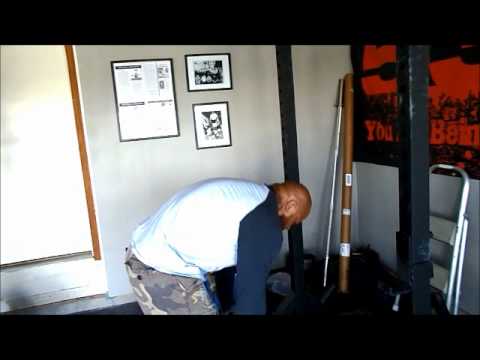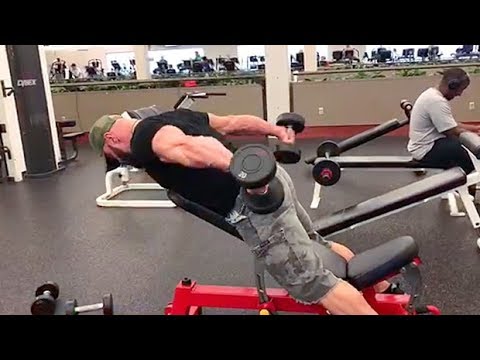High rep sets build muscle. A high rep set can be anywhere between 10-30 reps.
However, intensity is the most important factor in building muscle. If you do 30 reps and you’re nowhere close to failure, you’re just going to create unnecessary fatigue without forcing your body to adapt.
In today’s post, I’ll go over the best sets and reps, why bodybuilders use high reps to get as big as possible, and even if 100 rep sets build muscle!
Let’s get started!
Table Of Contents
What Reps Build Muscle?
While high reps allow you to build muscle, there are other rep ranges that get the job done as well.
Otherwise, powerlifters that train with lower rep sets would never gain muscle.
That being said, though, the most successful bodybuilders, powerlifters and other performance athletes train with higher rep sets to maximize mechanical tension.
The rep ranges that are most commonly used are between 5-20 reps.

They all build muscle, but the most important factor for muscle growth is intensity.
If only do 5 reps but could do 10, you will not build much muscle from that set.
Your body needs some reason to synthesize new muscle tissue.
That is why mechanical tension and training close to failure are so important.
You can build just as much muscle doing sets of 5-10 to failure as you can doing sets of 15-20.
The further you get from the midrange of reps, the more fatiguing it is.
If you do a set of 5 to absolute muscular failure, that weight is going to be pretty heavy.
On the flip side, if you do a set of 20 to failure, you’re going to create even more fatigue, which is harder to recover from.
So, if you want to maximize your training stimulus and recovery, the 8-12 rep range will be the most optimal for muscle growth.
Do most of your sets to failure in this range, and you’ll get the best gains possible.
Will 100 Reps Build Muscle?
100 rep sets are something that I’ve experimented with in the past after following some of Paul Carter’s training on his blog, Lift Run Bang.
These types of sets are going to create a ton of metabolic stress, and unless you train close to failure, it’s going to be a waste of time
Plus, the weight required to do 100 reps without rest will be light.
The other way you can do it is like Paul Carter’s 100 rep training program, which is very similar to Rest Pause training.
- You pick a weight you can do for 30-50 reps in one set.
- Once you do your first set to failure, take 10 deep breaths while holding onto the bar or dumbbell for whatever exercise you’re doing.
- Then, bang out another set to failure and repeat until you get to 100 total reps.
Here’s what this kind of set looks like!
Doing it this way will actually fix some issues of the weight being too light.
However, this is still a really inefficient way to train and something I don’t recommend.
It’s going to create too much fatigue, which is the same problem that doing something like German Volume Training causes.
10 sets of 10 is just too much work for anybody to do long term and make progress on.
Plus, even if you make progress doing that, you’d make even more progress doing fewer sets and pushing close to/to failure.
100 rep sets sound cool on paper, but they aren’t a good idea in real-life applications.
Is 20 Reps Too Much?
While 100 reps are too light and fatiguing to have much merit, sets up to 20 reps can build just as much muscle as sets of 8-12.
So, no, sets of 20 reps are not too much to recover from and do a good job of building muscle.
The key thing, though, is that you need to be pushing close to failure for maximal muscle growth to occur.
The other thing you need to understand is that sets of 20 reps are way more fatiguing than more moderate rep sets.
So while they’ll build the same amount of muscle as long as your proximity to failure is equal, they’ll be harder to recover from as well.
However, there are some exercises that are just going to do better in higher rep ranges.
Things such as rear delt swings, plate raises, and many other exercises are going to be harder to load with heavier weights.
So if you feel like the weight is too heavy for your joints on an exercise, sets up to 20 reps absolutely have their place!
Why Do Bodybuilders Do High Reps?
I’m going to make this as brief as possible. If you look at the average powerlifter compared to bodybuilders, they’re going to have much less muscular development.
On the flip side, if you look at elite level powerlifters, they have a ton of muscle mass!
If they leaned down to sub-10 % body fat, they’re going to look comparable to bodybuilders.
The reason for this is simple: the best powerlifters know they can’t just work in the lower 1-5 rep range for all of their training.
Sure, you’re going to get really strong doing that, but you will not build as much muscle as possible.
That’s why in the off-season, elite-level powerlifters do a ton of bodybuilding work to build more muscle and increase their strength ceiling as much as possible.
After all, a bigger muscle has the potential to be a stronger muscle.
The reason bodybuilders do high reps is pretty simple, it is much more effective at building muscle than low reps.
You need to accumulate enough effective reps to push muscle gains.
If you’re only doing sets of 5 to failure, it’s really systemically fatiguing and dangerous as well!
If you want to build the most muscle possible, higher rep sets close to failure is what you need to be doing!
Do High Reps Build Muscle Or Tone?
This is a question I get often as well, unfortunately.
Many people are throwing around vague goals like “I want to tone”, or “I don’t want to get bulky.”
The funny thing is, they’re both accomplished using the same method, mostly.
When people say they want to “tone”, they’re referring to building muscle or bulking as it’s commonly called.
However, becoming “too bulky” is very hard to do and even the people that want that as their goal have a hard time doing it.
That being said, do high reps build muscle or tone?
Yes.
That’s it, that’s my answer…
No, but seriously, if you just want to “tone” and stay lean, high reps will get it done.
As long as you’re increasing your weight and reps over time, you’re going to build muscle and/or tone.
Whatever you decide to label your goals, high reps will get it done.
Conclusion
Now I turn it over to you!
Did this post help you figure out if high rep training is right for you?
And if so, are you going to incorporate higher reps for certain exercises?
Either way, let me know by leaving a comment below, right now!
Until next time,
-Dante


